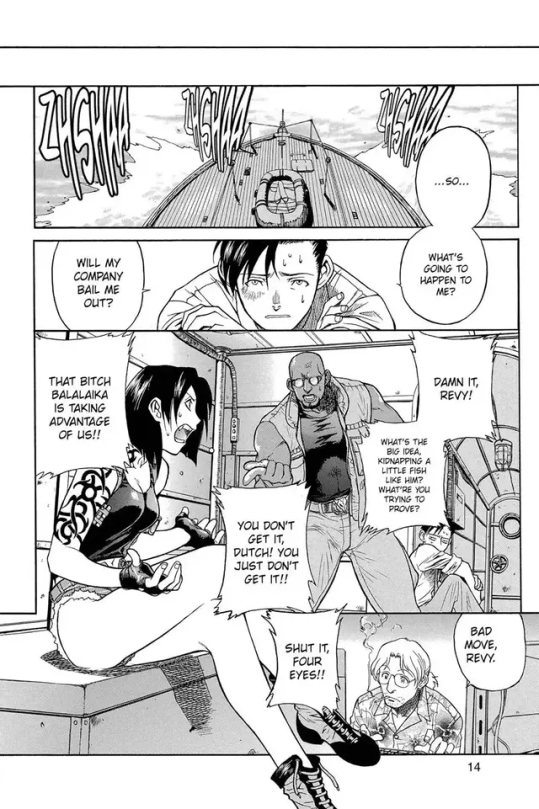#jewish nerd
Explore tagged Tumblr posts
Text
I didn't used to be a fan of Shavuot (I mean, the events at our Shul were fun as a kid), but now, as an adult, I love it. I love studying Torah, and I love the fact that today was the day that we (well, Moshe technically) received the Ten Commandments and Torah at Mt. Sinai on this day in the Hebrew calendar.
Also, the day they were so paranoid about breaking the new Kosher laws from Torah, they only ate cheese.
#jewish nerd#jewish#judaism#shavuot#chag sameach to the western hemisphere#judaism son#i love this holiday#festival of weeks#we've been patiently impatiently counting
2 notes
·
View notes
Text



For Hebrew lettering practice today, my cousin gave me this book that belonged to her sister--it was given to her almost 50 years ago! I think this might be the oldest book I own now.
224 notes
·
View notes
Text
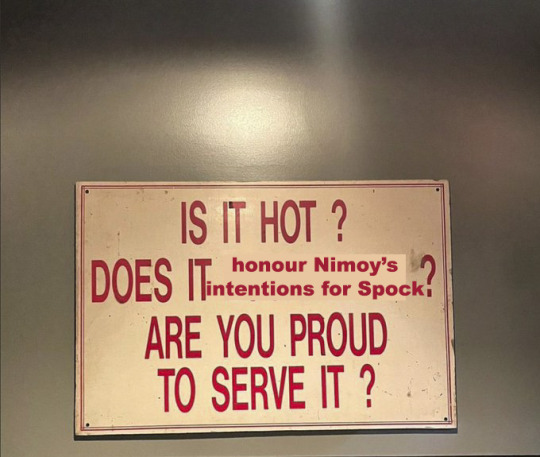
sorry I'm not a photoshop master but would someone mind hanging this up in the SNW writers' room because I think we have all had enough
#Nimoy's portrayal of Spock is INTENTIONALLY Jewish coded and visibly queer coded#you can claim ignorance as a casual fan but as a writer it's your JOB to know and honour this shit#SNW has done ok with autistic coding of Spock but the erasure of the other stuff feels deliberate at this point#like cishet white nerd men want him to be like them so they make these bizarro choices that feel like a totally different person#sorry but he's not FOR you#he was NEVER for you#you already have everything else please just let him be the way he was intended to be#let us have one gd thing#why are the opinions of people who don't care about Star Trek's ethics and legacy more important than the opinions of the those who do#star trek#strange new worlds
3K notes
·
View notes
Text
Rip Dave Katz you would've loved Falsettos
#is this too niche#idc#im a jewish queer theatre nerd and tua stan#the umbrella academy#umbrella academy#tua#ua#dave katz#klave#klaus hargreeves#broadway#musical#musicals#Theatre#theater#musical theater#musical theatre#Falsettos
31 notes
·
View notes
Text

happy new year, newsies fandom! have a lil sketch i did to welcome you to 2025! so glad i found this community— you guys are the sweetest :D
#newsies#david jacobs#jack kelly#katherine pulitzer#davey jacobs#katherine plumber#new years#2025#jatherid#javey#jatherine#jewish david jacobs#yes jacks shirt says new year who dis#and daveys says not quite Rosh Hashanah#newsies fanart#sending love from myself and these nerds#sonorousdraws#kavey newsies#datherine#what’s their ship name idk#but they’re holding hands i just can’t draw that so i cut it off
21 notes
·
View notes
Note
Can a furry be Jewish?
Are you asking for a friend?
#the serious answer is yes#do u know how many Jewish furries I've met?#the nerd culture overlap is a lot lol
30 notes
·
View notes
Text
I love that the people in my shul talk about being a mt. sinai and leaving egypt like, "well, I was in egypt and I saw you at egypt and we were..."
#jumblr#jew by choice#jewish conversion#personal thoughts tag#shul shenanigans#well i was at mt. sinai and i was crocheting :3#and i was leaving egypt and i was packing my instruments#i saw all my shul buddies too and they were doing math problems :(#seriously my shul is FILLED woth math nerds and i don't get it HELP#i know it's not a special thing to talk about leaving egypt and being at mt. sinai but i still love it okay!#we're supposed to treat it like we were physically there at mt. sinai and leaving egypt and i really like how people express that
22 notes
·
View notes
Text
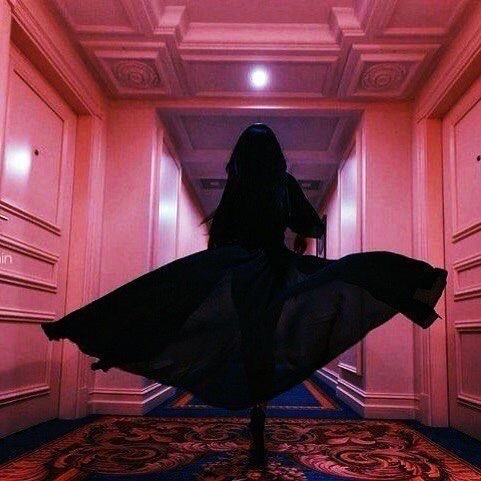
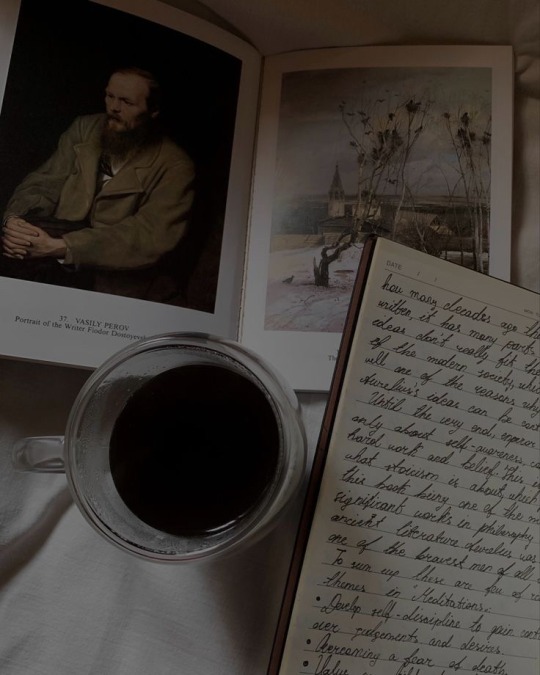

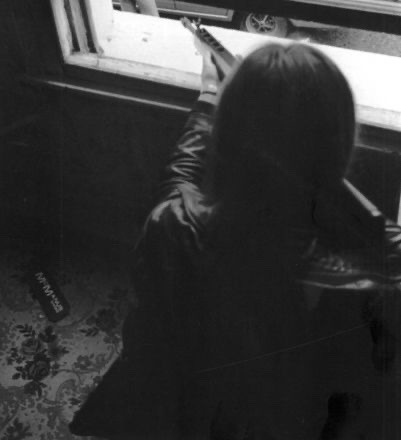

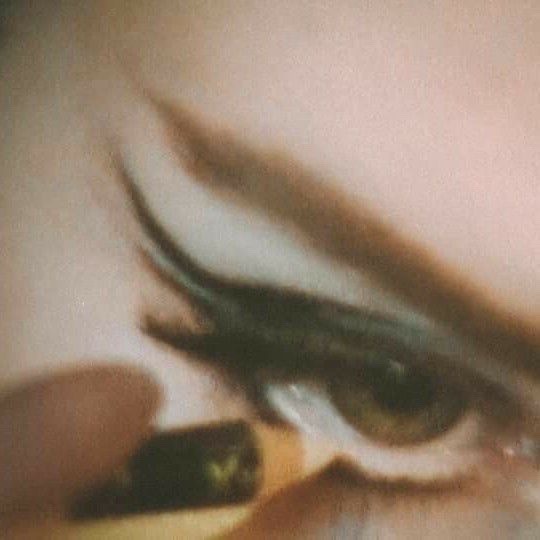
"But I can't know God's intentions... How could it depend on my decision... Who made me a judge of who shall live and who shall not?" - Crime and Punishment
#oc: sophia a. naumenko/sonya#I'm back with another moodboard for another little girl#i usually call ocs my daughters dont ask why#she's a rather old oc way pass 10 years old but i love revisiting old characters and give them a little upgrade bc my writing at the time#was shit or i didnt do enough research for them#i'm actually quite proud of myself she's the only oc who's over 30 years and was married#and divorced lol#her lore is crazy around those years#and she's my second jewish character#the pastries at the bottom left are hamantaschen they're served on purim and she was born during purim katan#i found this out yesterday when i checked the calendars but i'm happy with that detail she deserves to be born on a joyous holiday#although she's a hellsing oc her story is set during the dawn timeline bc as a history nerd i cant keep myself away from ww2#and the cold war#at least i have reasons to research the 60s and the 70s more#and since deep down i know that the dawn will never be finished i got a lot of room for worldbuilding and headcannons#bc i'm not that tied to cannon events#the old version of her had some supernatural abilities but now I decided that she'll be a regular human who's just a damn good sniper#it's way more fun to have a mortal character thrown into this story and setting and see how she interacts with all the stuff going on#and this also means she had to keep her involvement with the organization a secret to her ex-husband#i'm gonna put her in the tags yall have some damn good and pretty ocs out there its like releasing your child at the playgrounds#hellsing oc#my moodboards :3
10 notes
·
View notes
Text
Why is Hannukah eight days if the oil was sufficient for one day? Day 6.
Today, I chose to cheat.
But why? Why would I build a system of rules for writing those posts only to break them myself later? Well, it's because history left me no choice! A bunch of people who held manuscripts of Sefer Ha'Itim have lost parts of it, and now the world suffers! But, a little background:
Sefer Ha'Itim by Rabbi Yehuda ben Barzillai Albargeloni (the Barcelonian) is an old Halachic book. And by old I mean old. There are apparently indications that it was written when the RIF (Rabbi Yitzhak Alfassi) was still alive when it was written, since there's never an addition of z"l after his name - unlike other deceased rabbis. That places it at around the 11th century CE, the beginning of the Rishonim era. So it's not too surprising that not all the book survived, especially since many of it's rulings weren't accepted. I think. I'm basing it on one particular ruling, which I'll get to later.
The book itself is about Halachot for time-dependant things - I suppose that would make it a rough equivalent of Tur Orach Chaim in the Shulchan Aruch, though this is a very common topic for books. I mean, if you deal with the daily, weekly, monthly and yearly Halachot... Well, people kind of need such books for their lives. Unlike Tur 'Hoshen Mishpat, which is about Halachot related to court (mostly monetary conflicts) and no one wants them to be relevant to them. Anyway, like most books, the topic is in the name: 'Itim means "times" in Hebrew, more or less. Not to be confused with 'etim, which means pens.
What remains from Sefer Ha'Itim, though, is just the Halachot related to Shabbat. Which is great if you want to know whether or not you're allowed to say HaKol Yoducha (ypu aren't, and it's really not fine that everyone still does - at least, that's what Rabbi Albargeloni thinks), but it's not as helpful if you want to know why Hannukah is eight days and not, say, seven.
Or nine.
Yeah, yeah, it turns a bit weird now and I really should stop throwing those random hints. His very interesting answer to why Hannukah is eight days is somewhat reminiscent of the reasoning the book of Maccabees gives in that it has nothing to do with the oil cruse miracle and everything to do with another thing that takes 8 days. In the case of the 'Itim, it's Brit Milah.
You see, among the things that happened during the time of Antiochus IV Epimanes that really annoyed the Hasmoneans, he gave a decree of three things practiced in Judaism that he forbade: keeping the Shabbat, declaring the renewal of the moon (which is essential for the Hebrew calendar - or was, until about 5 centuries later at the time of Hillel the 2nd, but that's a story for another day), and circumcising their sons. And in Judaism, circumcision is done on the 8th day to the birth of a child - if he's healthy enough for it, there are clauses for keeping the baby alive, but that's (again) another story. Naturally, the Hasmoneans spited him in all three, and when they rededicated the Temple, according to Sefer Ha'Itim, they declared an 8 day holiday to commemorate the resistance. Also, due to this length there's always a Shabbat yo be kept in Hannukah, and due to its particular date there's always a renewal of the moon during the holiday. It's occuring around today or tomorrow, actually! This night is going to be moonless, remember and take care.
So I cheated. I did not find the original source, though I now have Sefer Ha'Itim downloaded to my phone. I could scour it just in case, but I don't think it'll bear fruit.
The nine days things is all kinds of weird in and of itself - it's based on Yom Tov Sheni Shel Galuyot, and the obvious answer is it's something that only exists for Yom Tov. And wow, that has been longer than usual. Sorry.
#jumblr#judaism#jewblr#Hannukah#Why is hannukah eight days?#The beit yosef question#Sefer Ha'Itim#That one catalan rabbi from the time Catalonia was Muslim#As was the rest of spain#Or most of it#Some books were pretty much lost to history and it's really a pity#Maybe tomorrow I should see if the Me'iri has anything to say on the topic#To talk about books that were lost and found#Am I using this to nerd out a little about jewish religious literature?#If so you should be thankful I'm not half as obsessed with this topic as I could be#There is much that can be said on every book I've mentioned so far#The 'Itim in particular was of interest to me regarding Piyutim#As mentioned in the post he has... Odd opinions#Everybody says HaKol Yoducha nowadays#Even though it's very easy to see it's a piyut and not a regular part of the Brachah it's said in#And that is another thing I can nerd out about.#Anyway#Have a good day!
5 notes
·
View notes
Text
Jewish History and Zionism.
Or: why you gotta be so difficult about that tiny piece of land?
Ft. Britain, Ottoman empire, the Age of Enlightenment, and helll lot of racism.
(But like. That was obvious.)
ToC:
Britain, shortly (or: the problem with "but they created Israel!!")
Indigenous
Jews in the 19th century
The ottoman empire (pt.1 - geography and maps)
Bibliography (cited articles)
Edit: I changed/removed things that were spesificly for the person I had this discussion with, as they show understanding of what was problematic with their og comment, and regrets it.
~
A. This was not about you personally. It was about the way Jewish pain is constantly generalized and turn into something for "the world". Somehow, Jewish tragedies are either ignored or "a lesson for the world".
B. My problem with the term was that by saying "as a FELLOW JEW" you claim relationship to the community and kinship which you later use to dismiss cultural and community issues. You are Jewish (as your mother). My issue is that the only usage you seem to have is to make claims. This is... disturbing, seeing claimed made while ignoring the historical background. (AKA 2,000 years of exile, enslavement, oppressions and murders).
~
1. Britain:
The British were involved in the creation of The Jewish State, Israel by the “Balfour Declaration”. The League of Nations is a predecessor to the United Nations.
Yes, the British were involved in the creation of the Jewish state. As well as the Emirate of Trans-Jordan (1921-1946) - later became "Hashemite Kingdom of Jordan" (est. 1946). Also in the creation of India, Pakistan, and many other countries no one seem to have an issue with.
Also the france were involved in the creation of Lebanon, Algeria, Lybia, etc.
(The world was mostly controlled by EMPIRES. So yes. When an empire fall apart, sometimes there is an involvement in what happens next.)
Focusing on a certain group and judging them and their actions by different standards then others is. Uh. Pretty racist view, you know?
Britanica:
Alarmed by the extent of Arab opposition, the British government issued a White Paper in June 1922 declaring that Great Britain did “not contemplate that Palestine as a whole should be converted into a Jewish National Home, but that such a Home should be founded in Palestine.” Immigration would not exceed the economic absorptive capacity of the country, and steps would be taken to set up a legislative council. These proposals were rejected by the Arabs, both because they constituted a large majority of the total mandate population and therefore wished to dominate the instruments of government and rapidly gain independence and because, they argued, the proposals allowed Jewish immigration, which had a political objective, to be regulated by an economic criterion.
This is the area of the "British Mandate of Palestine". Brits had separated it and gave 2/3 and claimed it a different reign.
As for governing - The Hashemite emir Abdullah, elder son of Britain's wartime Arab ally Hussein bin Ali, was placed on the throne of Transjordan.
Yet, for some reason, no one ever said anything like "from the river to Iraq, all the land will be back."

Hi, guess what is it called when there are laws that forbid and heavily reduce members of a spesific group from living in certain areas?
(Strangely, no such boundary was set on the immigration of Muslims, Christians, or any other kind of people. Only jews.)
Source: Israel embassy
In 1920, the Council of the League of Nations appointed Britain as the Mandatory entrusted with the administration of the Land of Israel. The borders of the land, as a separate country, were defined for the first time in many centuries. Until then, under the Ottoman Empire, the land's boundaries had not been defined because it was part of other large Ottoman districts like the district of Damascus and was not a distinct political unit. The term name "Palestine" that was chosen for this Mandate was based on the term name "Palestina" that was given to the country by the Roman Empire in the second century CE. The territory of the British Mandate included land on both sides of the Jordan River, encompassing the present-day countries of Israel and Jordan. About 77% of this Mandate was east of the river Jordan River, and in 1921, Great Britain created there a separate administrative entity called Transjordan. The changed mandate took effect in 1923
2. Indigenous
Here's another part I want to dig in deeper:
"(the arabs) constituted a large majority of the total mandate population" -
The Arabs. Notice the name? I wonder how they got there. A true mystery. Green: Arab Peninsula. Red: area in question.

Hebrew was spoken in the area long before Muhammad and the Muslim empire.
I grew up near a 2,000 year old burial cave. The stories I learnt about my heritage happened in places I knew, with names I understood the meaning of.
This is the equivalent of calling for land back in Pennsylvania in the name of Pennsylvania Dutch.
3. Jews in the 19th century
Part of the reason for low Jewish population in the area was that unlike any other people, Jews were legally prohibited from living in the area. Now, some background: in general, the Ottoman empire was a pretty descent place for Jews, comparing to other places. Sure, had to pay extra taxes and not allowed to live in places, but you can mostly know you won't be exiled once the authorities felt like (looking at you Britain, Yemen, Spain, Morocco, and more). The 19th century had marked a rise in nationalism (results to the Fall of Empires in the 20th century). It also saw the coin of a new term: "antisemism".
This came to describe Jew-hatred that isn't focused on the religious part ("they killed Jesus"/"They kept faith for themselves"), but seem to have a more "neutral" reason. Even scientific, as "they are naturally inferior" (see "the race theory", Eugenics, and more.) If you see similarities with Romanis in Europe and Black people in America - yes. This wasn't just about Jews - it was a general trend due to the so called "Age of Enlightenment" in Europe.
Part of the things that happened to/in the Jewish Community in the 19th century including:
1860: Foundation of "Alliance Israélite Universelle" an international Jewish (charity) organization.
First mass Aliya (immigration to Israel) of Yemeni jews in 1882/Jewish year of תרמ"ב (aka "אעלה בתמר")
1827 (Russia): the "cantonists' Decree"
The "okaz" (regulation, instruction) of the emperor from the end of August 1827, which imposed an obligation on the communities to provide the monarchy with a fixed quota of rookie soldiers, stunned the Jewish population. The terrible tragedy of the kidnapping of Israeli children (from the age of twelve according to the law, but actually even from the age of eight) for military training is known in the history of Russian Jews, and has even been commemorated in literature. The service in the Nikolai army, which lasted twenty-five years, was counted from the age of eighteen, and the years of "education" of the minor abductees, the "cantonists", were not included in it, as these years were out of the calculation. The purpose of the government in this decree was to convert the Jews to their religion and to mix them with the Pravoslav Christian Russian population.
(translated from: Maor, Y., 1981)
1881-2: Sufot Banegev - mass Pogroms of jews in south-east Russia (Ukraine, Poland) after Tzar Nikolai's murder. The Jews were accused of the murder. I was unable to find any information in English, but here's one in Hebrew ("today in history"). (I might be able to get one in Russian if you know that.)
May Laws (link to online version of the Jewish Encyclopedia.)
During the 1880s - founding of multiple "Lovers of Zion" organisations in Russia.
The assassination of Tsar Alexander II in 1881 ushered in a painful new era. The pogroms after his death were followed by the notorious 'May Laws' of 1882 which stepped up economic discrimination against the Jews. The stirring among the Jewish community, both physical and intellectual, was heightened. Many more of them started to leave, mainly for America, and not a few began to think seriously about Jewish nationalism, with the result that the 'Lovers of Zion' Movement gained momentum. Some of them, whether for reasons of sheer physical safety or nationalism or a combination of both, thought of finding a home in the Ottoman Empire. (Mandel, 1974)
1894 (France): The Dreyfus affair
Theodore Herzl, a Jewish Journalist, was there as a reporter. He said this was the moment he realised jews As a journalist in France, Herzl became extremely upset during the Dreyfus affair, in which a Jewish army officer was falsely accused and convicted of espionage. The only solution to the problem of the Jews, he decided, was to create a Jewish state. Although Dreyfus was ultimately pardoned (in 1906), the episode revealed that emancipation would be an incomplete and ongoing process.
1896 (Vienna): Theodore Herzl published his book "Der Judenstaat: Versuch einer modernen Lösung der Judenfrage" (The Jews’ State: An Attempt at a Modern Solution to the Jewish Question)
Herzl published this work, Der Judenstaat, to galvanize his fellow Jews into action. He asserts that emancipation itself caused antisemitism, since it failed as a movement. He concludes that Jews cannot continue to live among other nations since their presence inevitably gives rise to hostility. Herzl’s answer was for Jews to organize a mass migration to a territory of their own.
1897: the First Zionist Congress of the Zionist Organization. The official goal of Zionism (Basel Program) read: "Zionism seeks to establish a home in Palestine for the Jewish people, secured under public law."
As we can see, the 19 century wasn't good to jews, especially in Russia (and I mean Russia of that time - which included the area of Ukraine, and parts of Poland). Starting with a legal forced children-kidnapping. During the 80s, massive pogroms, on long time and area, had spread terror among the Jewish communities. The authorities' refusal to assist and victim blaming weren't uncommon, but not in those masses. 2.4 million jews had left Russia during those years, mostly to the USA, Canada, and Argentina (115.000 ppl). 3% (~73,000 ppl) had immigrated to Israel.
Also a worldwide rise in nationalism*, that was also used as a reason for jew-hatred (bc what bring ppl together better than having the same enemy?). In France, the Dreyfus affair made Herzl realise that the emancipation (jewish semi-autonomous areas, a-la Reservations in usa) wouldn't work. It won't help to prevent the systematic and cultural discrimination. Eventually inventing *modern day* Zionism - secular consept. (not to be confused with Hibat Ztiyon/"Zion Loving" - which was an old Jewish consept since the first exile, 6th century BCE.
*Nationalism, as itself, wasn't a bad thing. It was a big part of decolonisation (as different groups in the empire demanded to have their own autonomy.)
4. Ottoman empire (Geography and MAPS)
Let's skip a few thousand miles away, to the Ottoman empire.
First thing we need to know is - how the map looked like, back then?
The empire was divided into different areas, that all had sub-areas, et al. For better understanding, think about it like USA's country vs. state. Vs. reign.
The empire was divided into different EYALETS (aka beylerbeyiliks. after 1860s- Vilayet), that contained several Sanjcks, that contained several Kazas.
This is a map of the empire in 1875, as it already started to fade:

Two more maps for better understanding of spesific areas
The Damascus Eyalet in 1795 (red):
(the north-west (top-left) is Sidon/Beirut/Sefad Eyalet. Do you see the Sea of the Galilee? It's the little dot in the middle).

1896:

Authority areas kept changing. This is another map, showing Vilayets (Syria, Beirut, Aleppo) and their Sanjaks (+independent Sanjak of Jerusalem).
I'm pretty sure that this one is the simplified version:

Why do I show it?
Well, first of all - definitions. Making sure we all know what area we're talking about. During the years, "Filistin"/"Palestine"/"Paleshet" used to refer to many areas: from almost all the southern levant to a coast reign, about the size of modern-day Gaza Strip.
Secondly? Our next part, about the Jews and the empire. Especially the 1881 declaration by the Council of Ministers that
"[Jewish] immigrants [would] be able to settle as scattered groups throughout Turkey, excluding Palestine".
(Mandel, 1974)
I wonder why..
~
I've been working on it for days, so I'll post this now and add the second part, in which I'll explain this last bit and continue, later.
Next part: immigration, Zionism, and the breaking point in the Jewish-Arab relationship (no, not 1948. It was 1929.)
Bibliography:
Mandel, Neville J. ( 1974). "Ottoman Policy and Restrictions on Jewish Settlement in Palestine: 1881-1908: Part I" (PDF). Middle Eastern Studies. 10 (3). Taylor & Francis, Ltd.: 312–332. Retrieved 29 March 2024.
Maor, Y. (1981). The “Sufot Banegev” as a Factor in the Rise of Nationalism among the Jewish Intelligentsia / ה"סופות בנגב" כגורם להתעוררות התודעה הלאומית בקרב המשכילים היהודיים. Proceedings of the World Congress of Jewish Studies / דברי הקונגרס העולמי למדעי היהדות, ח, 1–12. http://www.jstor.org/stable/23526296)
#history lesson#history#maps#seriously I put so much research on it#ottoman empire#britain#mandate#Palestine#israel#russia#19th century#jewish history#jumblr#nerding out#sufot Banegev#Zionism#well the beggining of#pogroms#mass murder#ukraine#poland#long bloody history#damn it#tbc
10 notes
·
View notes
Text




[Levi] doesn't have a black & red mask yet, so he grabbed some Sharpies and designed his own...
#the fact that we have a jewish star wars nerd goalie is ME representation#sabres#devon levi#like this fucking delights me#goalies#goalie masks
137 notes
·
View notes
Text
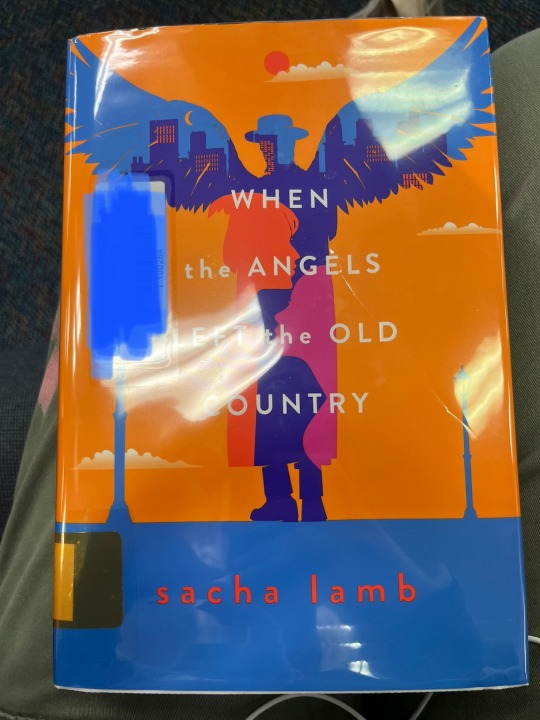
very excited because my school has jewish good omens (when the angels left the old country) and I’m one chapter in and already obsessed
#when the angels left the old country#good omens#jewish#jewish books#i love their dynamic so much#little ash is so interested in the shtetl gossip and i respect that#also i love that the angel/uriel can only understand hebrew but forced itself to learn aramaic to study talmud#what a nerd
34 notes
·
View notes
Text
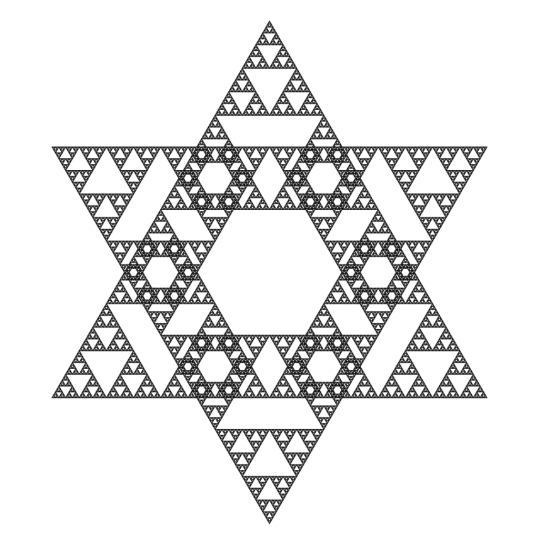
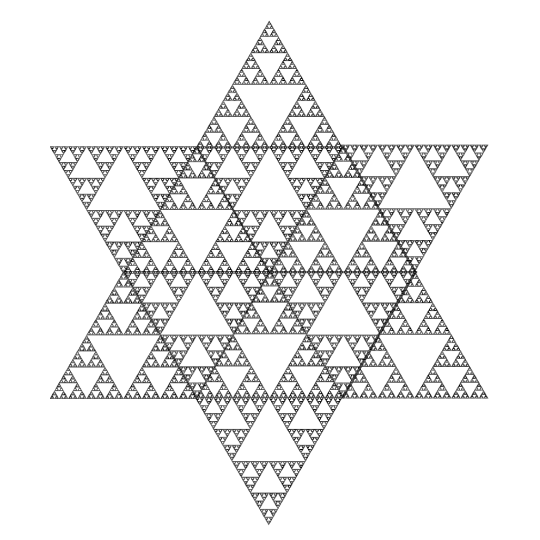
two quick edits: sierpinski's star of david!
i love doodling sierpinski's triangle, and it just occurred to me that the jewish star, being made of triangles itself, could be created using sierpinski's triangle :)
#dandy's doodles#jewish star#star of david#sierpinski's triangle#fractal#i was sketching for art class and it just occurred to me to draw a sierpinski's star of david. i had to follow through before the spark lef#it was the top one that i thought of first! like a typical jewish star it's made of one upside down triangle and one rightside up one#but then i thought too that a jewish star has six triangles all around the edges. so i made a version like that too#and i filled in the middle hexagon with six more (cuz six equilateral triangles tesselate into a regular hexagon!)#in classic sierpinski's triangle form both stars have smaller stars within them#recursion! yay!#anyway. this is how my silly nerd brain works. i love sierpinski's triangle <3
4 notes
·
View notes
Text
I hate how August is almost a self insert of me with the amount of similarities we have
#like#we are both jewish#both of us are ginger#we both work at some kind of coffee shop owned by out family (even tho for them it's more regularly)#we are both huge nerds (especially when it comes to lit)#for fucks sake i wrote my cat in as their cat#august goldsmith#August Goldsmith's Guide of Befriending Vigilantes#dc comics#dc universe#batfam#batfam fanfic#ao3#oc
4 notes
·
View notes
Text

Just cosplayer things: Everyone at rehearsal is very impressed with the royal-looking cloak I happened to have around for playing King Ahasuerus in our Purim spiel.
Some of you may, uh, recognize it
#going to wear the matching gold tunic underneath for the actual show too#(albeit with some other costume elements)#the rabbi was particularly excited about the little shoulder pauldron which made me laugh#nerd alert#jewish tag
47 notes
·
View notes
